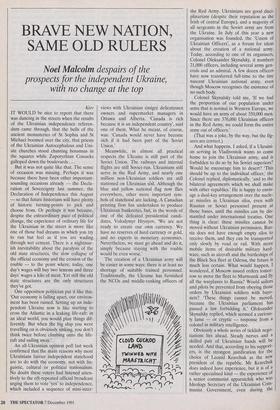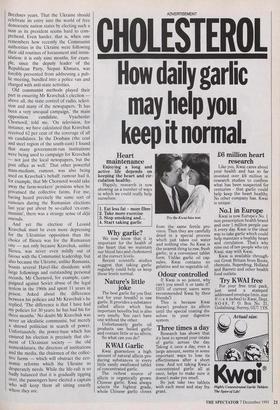BRAVE NEW NATION, SAME OLD RULERS
Noel Malcolm despairs of the
prospects for the independent Ukraine, with no change at the top
Kiev IT WOULD be nice to report that there was dancing in the streets when the results of the Ukrainian independence referen- dum came through, that the bells of the ancient monasteries of St Sophia and .St Michael boomed over the city, that priests of the Ukrainian Autocephalous and Uni- ate churches stood chanting hosannas in the squares while Zaporyzhian Cossacks galloped down the boulevards ...
But it was not quite like that. The sense of occasion was missing. Perhaps it was because there have been other important- sounding occasions already — the Decla- ration of Sovereignty last summer, the Declaration of Independence this August — so that future historians will have plenty of historic turning-points to pick and choose from. Or perhaps it was because, despite the extraordinary pace of political change, the experience of ordinary life for the Ukrainian in the street is more like one of those bad dreams in which you try to run but feel as if you are wading through wet cement. There is a nightmar- ish inevitability about the paralysis of the old state structures, the slow collapse of the official economy and the erosion of the rouble — to the point where, today, one day's wages will buy two lemons and three days' wages a kilo of meat. Yet still the old state structures are the only structures they've got.
One opposition politician put it like this: `Our economy is falling apart, our environ- ment has been ruined. Setting up an inde- pendent Ukraine now is like starting to cross the Atlantic in a leaking life-raft: in an ideal world, you would plan things dif- ferently. But when the big ship you were travelling on is obviously sinking, you don't think twice before climbing onto the life- raft and sailing away.'
An all-Ukrainian opinion poll last week confirmed that the main reasons why most Ukrainians favour independent statehood are to do with the economy, not with lin- guistic, cultural or political nationalism. No doubt these voters had listened atten- tively to the oft-repeated official broadcast urging them to vote 'yes' to independence, which included a sequence of mini-inter- views with Ukrainian émigré delicatessen owners and supermarket managers in Ottawa and Alberta. 'Canada is rich because it is an independent country', said one of them. What he meant, of course, was: 'Canada would never have become rich if it had been part of the Soviet Union.'
Meanwhile, in almost all practical respects the Ukraine is still part of the Soviet Union. The railways and internal flights are still Soviet-run. Ukrainians still serve in the Red Army, and nearly one million non-Ukrainian soldiers are still stationed on Ukrainian soil. Although the blue and yellow national flag now flies everywhere, other more important sym- bols of statehood arc lacking. A Canadian printing firm has undertaken to produce Ukrainian banknotes, but, in the words of one of the defeated presidential candi- dates, Volodymyr Hrynyov, 'We are not ready to create our own currency. We have no reserves of hard currency or gold, and no experts in monetary economics. Nevertheless, we must go ahead and do it, simply because staying with the rouble would be even worse.'
The creation of a Ukrainian army will be easier in some ways: there is at least no shortage of suitably trained personnel. Traditionally, the Ukraine has furnished the NCOs and middle-ranking officers of the Red Army. Ukrainians are good disci- plinarians (despite their reputation as the Irish of central Europe), and a majority of all sergeants in the Soviet army are from the Ukraine. In July of this year a new organisation was founded, the 'Union of Ukrainian Officers', as a forum for ideas about the creation of a national army. Today, according to one of its organisers, Colonel Oleksander Skynalsky, it numbers 21,000 officers, including several army gen- erals and an admiral. A few dozen officers have now transferred full-time to the tiny nascent Ukrainian national army, even though Moscow recognises the existence of no such body.
Colonel Skynalsky told mc, 'If we had the proportion of our population under arms that is normal in Western Europe, we would have an army of about 350,000 men. Since there are 376,000 Ukrainian officers in the Red Army, we could form the entire army out of officers.'
(That was a joke, by the way, but the fig- ures are correct.)
And what happens, I asked, if a Ukraini- an serving in Vladivostok wants to come home to join the Ukrainian army, and is forbidden to do so by his Soviet superiors? Would he encourage him to desert? 'This should be up to the individual officer,' the Colonel replied, diplomatically, 'and to the bilateral agreements which we shall make with other republics.' He is happy to envis- age a dual-key arrangement over the nucle- ar missiles in Ukrainian silos, even with Russian or Soviet personnel present at those bases, until the missiles can be dis- mantled under international treaties. One thing is clear: these missiles cannot be moved without Ukrainian permission. Rus- sia does not have enough empty silos to receive them, and they can be transported only slowly by road or rail. With more mobile items of desirable military hard- ware, such as aircraft and the battleships of the Black Sea fleet at Odessa, the future is much less certain. What would happen, wondered, if Moscow issued orders tomor- row to move the fleet to Murmansk and fly all the warplanes to Russia? Would sailors and pilots be prevented from obeying those orders by Ukrainian soldiers with bayo- nets? 'These things cannot be moved, because the Ukrainian parliament has passed a law forbidding it,' Oleksander Skynalsky replied, which seemed a curious- ly lame — or cryptic — response from a colonel in military intelligence.
Obviously a whole series of ticklish nego- tiations lies ahead. Steady nerves and a skilled pair of Ukrainian hands will be needed. And that, according to his support- ers, is the strongest justification for the choice of Leonid Kravchuk as the new president of the republic. Mr Kravchuk does indeed have experience, but it is of a rather specialised kind — the experience of a senior communist apparatchik who was Ideology Secretary of the Ukrainian Com- munist Government, even during the
Brezhnev years. That the Ukraine should celebrate its entry into the world of free democratic nation states by electing such a man as its president seems hard to com- prehend. Even harder, that is, when one remembers how recently the Communist authorities in the Ukraine were following their old routines of harassment and intim- idation: it is only nine months, for exam- ple, since the deputy leader of the Republican Party, Stepan Khmara, was forcibly prevented from addressing a pub- lic meeting, bundled into a police van and charged with anti-state activities.
Old communist methods played their part in ensuring Mr Kravchuk's election above all, the state control of radio, televi- sion and many of the newspapers. 'It has been a very unequal campaign,' the main
Opposition candidate, Vyacheslav Chornovil, told me. 'On television, for instance, we have calculated that Kravchuk received 62 per cent of the coverage of all six candidates. In the Donbass (the coal and steel region of the south-east) I found that many government-run institutions were being used to campaign for Kravchuk — not just the local newspapers, but the post office as well.' That other powerful mass-medium, rumour, was also being used on Kravchuk's behalf: rumour had it, for example, that Mr Chornovil would take away the farm-workers' pensions when he privatised the collective farms. For me, having heard precisely the same sort of rumours during the Rumanian elections last year put about by so-called 'ex-com- munists', there was a strange sense of déjà entendu.
And yet the election of Leonid Kravchuk must be even more depressing for the Ukrainian opposition than the choice of Iliescu was for the Rumanian one — not only because Kravchuk, unlike Iliescu, was never even mildly out of favour with the Communist leadership, but also because the Ukraine, unlike Rumania, boasts several Havel-like dissidents with large followings and outstanding personal records. Mr Chornovil, for example, cam- paigned against Soviet abuse of the legal system in the 1960s and spent 11 years in prison. Asked about the difference between his policies and Mr Kravchuk's he replied, The difference is that I have had my policies for 30 years; he has had his for three months.' No doubt Mr Kravchuk was never an idealistic communist, but merely a shrewd politician in search of power. Unfortunately, the power-base which has ensured his election is precisely that ele- ment of Ukrainian society — the old ndmenklatura, the directors of institutions and the media, the chairmen of the collec- tive farms — which will obstruct the eco- nomic reforms which the Ukraine so desperately needs. While the life-raft is so badly balanced that it is gradually tipping over, the passengers have elected a captain who will keep them all sitting exactly where they are.



























































 Previous page
Previous page